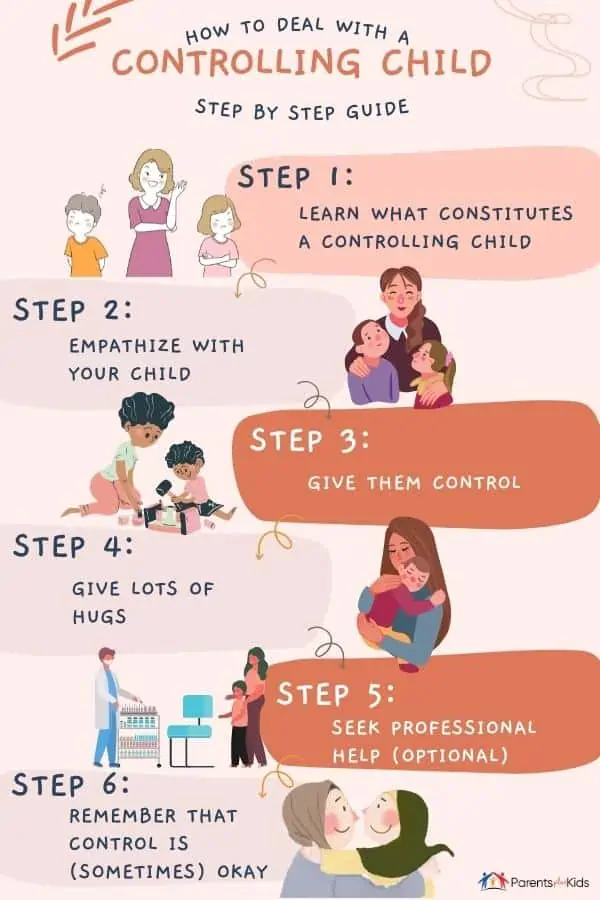How to Deal with a Controlling Child

This post may contain affiliate links. If you buy through the link, I may earn a commission. Learn More.
My mother had to be rushed to the hospital. She lives several hours away so I was completely powerless.
I cleaned my entire house because that was one thing I could control.
The same principle applies to children. If a child feels out-of-control, they will start trying to control everything.
*FYI, some of the links in this article about how to deal with a controlling child may be affiliate links. If you click and make a purchase, we may get a commission (at no extra cost to you). For more info, please see our disclaimer.
How to Deal With a Controlling Child

Find out why your child feels the need to control their environment. They may have low self-confidence, or they might be having troubles that you don’t know about. Once you know where it’s coming from, give your child space, love, and responsibilities that will help them focus their control issues.
Step 1. Learn What Constitutes a Controlling Child
Controlling children exert dominance over their environment. This may happen in all environments or only at home, at school, or when playing with friends.
Control issues may reveal themselves when children insist other kids follow them.
They may insist they get to make the rules or don’t have to follow rules their parents make. Controlling children often get upset when their leadership is questioned.
I live in a neighborhood with many children, and because my house is centrally located, it is where all of the neighborhood kids congregate.
I witness these control issues on a daily basis.
- David* will only play games that involve Nerf gun wars. He will scream, shout and eventually leave if he doesn’t get his way.
- Elizabeth* changes her favorite game on a whim, and if the children don’t follow her, she stomps home.
My daughter says they are hard to play with because they always want to be in control.
Step 2. Empathize With Your Child

I know David’s family very well.
He is raised by a single mom who, out of necessity, is extremely rigid with his schedule.
He has an early bedtime, has no choices when it comes to meals, and is not allowed to play with toys outside his bedroom.
She works long hours and doesn’t have any regular helpers so she is doing the best she can.
However, with no voice at home, he exerts control over his friends.
Elizabeth has a sister who is only two years older. Because of the closeness in their ages, Elizabeth wears her sister’s hand-me-downs, plays with her discarded toys, and sometimes feels invisible when she’s around.
Like David, she uses her friends to manage her need for control.
Many of us like to be in control of our own lives. When we feel out-of-control, we divert our attention to areas that seem more manageable.
For instance, one of my daughter’s dance teachers recently had a drastic haircut. When I asked why she went from waist-length hair to a pixie cut, she told me, “I realized my hair is the only thing in my life I can control.”
Try to see where your kids are coming from and relate to those feelings.
Do they feel they don’t have a voice at home? Is someone bullying them at school? Do they have a friend who is dominating them?
Work with your child to figure out the basis for their control issues.
Step 3. Give Them Control
Your child wants to be in charge of something. Make it happen.
Tell them that while they can’t control everything, and they still have to follow household rules, they can have more of a voice at home.
Give them one day a week in which they can pick the dinner menu. Let them pick out their own clothing (within reason – you don’t have to allow bikinis at school!).
Give them responsibility over a pet.
Let them be in charge of the chore chart. There are many ways to give children some control without letting them take over your home.
My children are partners in our household.
I have told them often that our home is not a democracy, that parents get final say in all matters, but their opinions are wanted and valid.
They can weigh in on everything from what we’re eating tonight to our summer vacation plans.
They know that their opinions aren’t just heard but that they matter. It’s very important for children to know they have a voice.
Step 4. Give Lots of Hugs

This should be a no-brainer. However, a child who feels out-of-control needs security. They need to know that they are loved and cared for.
Hug your child as often as they will allow.
If your child is uncomfortable with physical displays of affection, tell them you love them. Show them you care. Listen when they speak. Tell them how proud you are of them.
It’s okay to get excessive with love and praise when it comes to your children. You can never love your kids too much.
Step 5. Seek Professional Help (Optional)
The simple ways to manage controlling children don’t always work. You might find yourself in need of professional intervention.
A good place to start is with your child’s doctor. Your pediatrician should be able to give you a list of psychologists and counselors who specialize in working with children.
Another option is your child’s school counselor. They are often able to provide insight that you don’t have.
Step 6. Remember That Control is (Sometimes) Okay
Babies naturally exert control over their environments. This is a survival mechanism. They must make demands of those around them.
Children continue to be controlling as they get older, but that should lessen with time.
When children see that they will be taken care of without it being demanded, they should be less controlling. Unfortunately, it doesn’t happen overnight.
Key Takeaways
A controlling child is usually looking for reassurance, love, and a bit of their own power. It’s okay to give them all three.
Do you live with a controlling child? How do you manage your child’s control issues? Tell us about it in the comments!
*Names have been changed
Have You Read These Yet?
- Should You Charge Your Kid Rent? (Teen or Adult)
- How to Deal with an Ungrateful Child
- How to Deal with a Lazy Child (4 Simple Steps)
- How to Deal with an Entitled Teenager
- What Age Should a Child Stop Playing with Dolls?
